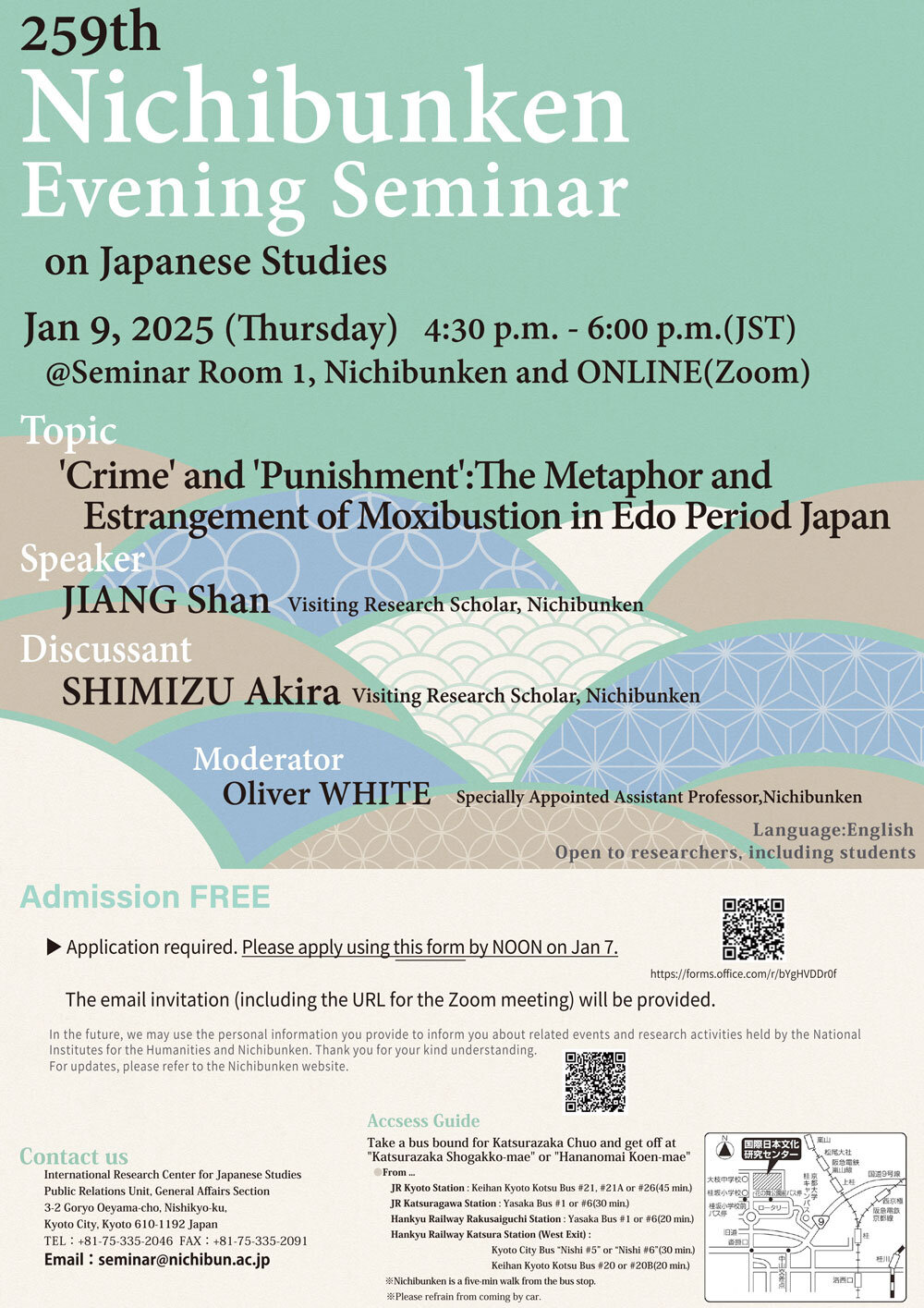第259回 Nichibunken Evening Seminar
 テーマ
テーマ
 概要
概要
 ▶ PDFを見る
▶ PDFを見る
|
Medicine works distinct from other natural sciences through its fundamental focus on human beings. While understanding health, disease, and healing from a scientific perspective is crucial, examining these aspects through the lens of real life reveals more individualized and practical dimensions. When we look beyond professional medical texts to explore medical history through images, social history, and literature, we may discover diverse human beliefs and practices related to life and survival in a ‘de-professionalized’ context. This presentation is a chapter from the speaker’s ongoing book. The book will examine how traditional therapeutic methods and culture transformed and became estranged after their transmission from China to Japan, exploring changes and innovations across multiple dimensions including theory, material culture, treatment methods, daily customs, and popular entertainment. Susan Sontag’s renowned work Illness as Metaphor suggests that certain diseases carry punitive metaphors targeting morality and behavior. People who commit certain ‘crimes’ must endure the ‘punishment’ of specific illnesses. As Sontag notes, considering illness as a punishment is the oldest idea of what causes illness. Beyond the suffering caused by disease itself, do medical treatments carry punitive metaphors as well? Or is the pain of treatment simply a part of the metaphorical punishment of disease? This presentation will give a case on burning moxa (お灸) to answer the questions. After its circulation from China to Japan, moxibustion became deeply embedded in people’s daily lives due to its ease of use, which also made it a common element in various forms of popular culture. However, alongside the growing popularity, moxibustion became estranged from its original medical purpose. The burning pain evolved beyond its surface meaning as a medical treatment. It fostered multiple layers of metaphor on both sides of ‘crime’ and ‘punishment.’ Here, ‘crime’ transcended unhealthy living habits. It took on humorous, entertaining, and satirical implications of ‘punishment’ for targeted groups. |
|
|---|---|---|
-
発表者姜 姍
国際日本文化研究センター 外国人研究員
- ディスカッサント志水 昭国際日本文化研究センター 外国人研究員
- 司会オリバー・ホワイト国際日本文化研究センター 特任助教
 開催情報
開催情報
| 開催日: | 2025年01月09日(木) |
|---|
- 場所:
- 国際日本文化研究センター セミナー室1(Zoomによるオンライン同時配信)
- 開始時間:
- 16:30
- 終了時間:
- 18:00
- 参加対象者:
- 研究者の方を対象(学生を含む)
- 言語:
- 英語
- 参加方法:
-
■ 申し込みが必要です。
1月7日(火)正午までに 申込みフォームからお申し込みください。
開催前日までにZoomミーティング入室用のURL含む、ご案内をメールでお送りいたします。
- お問合せ:
-
国際日本文化研究センター総務課広報係
seminar*nichibun.ac.jp(*を@に置き換えてください)
- 備考:
- 申込時にご入力いただいた個人情報は、大学共同利用機関法人人間文化研究機構関連事業や国際日本文化研究センターが主催するイベント及び活動等のご案内に使用いたします。あらかじめご了承願います。

